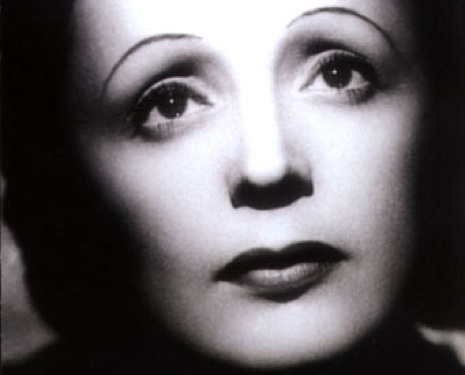
I’ve always been a sucker for the distinct musical genre of “torch songs” and a huge admirer of certain torch singers. A torch song tells sorrowful tales of longing for a love lost, romantic misfortune and of life’s harsher experiences. I’d say that a torch singer must have truly lived to sing in a manner worthy of the definition, and in this way, it is often world weary voices (think late-period Marianne Faithful) or somewhat idiosyncratic vocalists who dominate the field. The dominant image of the torch singer is a woman bathed in a nightclub spotlight telling bleak tales of love, passion, betrayal and hurt.
The greatest torch singers are probably Édith Piaf, Judy Garland, and Billie Holiday. Much of what Dusty Springfield sang and a lot of Cher’s solo material from the 60s and 70s would fall into the torch song category (such as her sublime tearjerker, “A Woman’s Story. which I have blogged about here before). Sade is certainly a torch singer. The pathos of Susan Boyle’s rather lonely backstory—coupled with Simon Cowell’s expert choice in material—would certainly put her firmly in the torch singer category. Amy Winehouse’s tabloid travails with drugs and alcohol make her an honorary member of this sisterhood, too.
Piers Ford, the proprietor of the The Art of the Torch Singer blog has a nicely “elastic” take on what makes a torch singer:
“Torch-singing is not limited by the genre of the music. It’s more about a sensibility evoked by a combination of the singer, her voice, the melody, the story, her performance and the lyric, that touches the listener in a special way. It’s a mood. A particular sound.”
In an interview with Cabaret Confessional, Ford offered this more nuanced definition of what makes a vocalist into a torch singer:
“[T]he ability to tell a story in song, with emotional conviction. Singers like these can hold a room in the palm of their hands, make the audience identify in a single note or word with the experience that they are singing about. It’s a very rare gift and not something that comes simply with being a professional singer. Acting comes into it, to an extent, but it’s also about using experience to render the lyrics authentic in that particular moment. I really don’t think you need to have experienced the clichéd excesses of a Judy Garland-style life to be an effective torch singer or cabaret performer, or even to have gone through the actual dramas that you might be singing about. But what the singers you mention – and many others I’ve encountered - all share is an ability to draw on their own life experiences to render a song “real”. Of course as the listener, you may or may not know something of their private lives. Sometimes that knowledge will make a performance more poignant, and obviously that’s what a lot of people are tuning into when they listen to the great torch singers – Garland, Holiday, Piaf. Perhaps it’s also partly why people turn out in droves for a Whitney Houston arena show, or why a low-key Amy Winehouse gig in north London excites such interest. But mostly, in the more intimate setting of cabaret where the torch singer really comes into her own, you’re responding to the honesty and clarity of an interpretation in the moment rather than the singer’s back-story and I think that’s where torch singing and cabaret coincide.
Elsewhere, Ford describes how torch singers, typically performing in cabaret settings, where food and drink was being served, had to pull out all the stops to get chattering audiences to pay attention. Cabaret would be the way to cut your teeth as a performer of this kind of music and I think this observation is a good one. Cabaret performers tend to flex different muscles when they’re before an audience than other types of singers, and so this, too, would be a big factor in how the form evolved. A torch song isn’t merely a love song, it’s something bigger, grander, deeper.
There are also several male artists who could be called torch singers: Gene Pitney, Scott Walker, Nick Cave, Antony Hegarty and perhaps the greatest male torch singer of all time, Marc Almond (who I have written about several times on Dangerous Minds) have all performed material that fits squarely in the genre, although we tend to think of females when the term is used.
It’s not a style of music that’s for everyone, I’ll grant you. Not everybody wants to listen to something weepy and depressing that will make them cry. But if you are someone who appreciates bleak songs of devastating emotional loss, may I point you in the direction of this incredible video for “Because You’re Gone,” from the new album, Genderful by Little Annie Bandez & Paul Wallfisch (Southern Records).
Little Annie—who has also recently been a collaborator with Antony and the Johnsons, Marc Almond and Baby Dee—does something so minimalist, yet so magnificent and powerfully moving here. I must have played this video twenty times yesterday listening to this song. Play this a couple of times before you move on (it’s short!), this performance is absolutely worthy of your attention, I promise you. This woman is an American cultural treasure, it’s a crime this has only had 10,000 views as of this writing. Video directed by David Merten.





